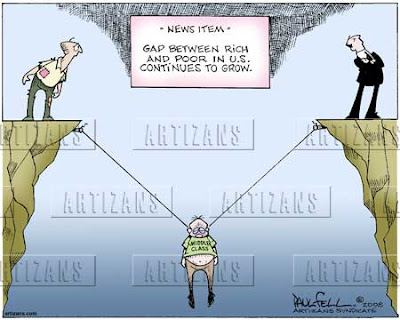Today
I found this quote from Kiyosaki on my Facebook wall. It says, “There’s the
rich, the poor and the tax payers…..also known as the middle class”.
So
simply stated, but a hard hitting fact. I then took some to ponder on this subject,
and felt that this middle class considers itself to be most vocal and harbinger
of change, however it is also the one which is most afraid of taking risks. It
accepts to follow standard practices, desires change but without having to work
for it (better if someone else could do it for them), prefers to credit
everything to destiny, and with a tendency to ridicule those who try to think
and do different in order to break away from the herd. And, traces of these
tendencies are even more distinctly visible when the subject relates to money
and wealth.
Those
were my personal feelings, something which I filtered out from my experiences
and from the environment in which I have ‘stayed’ for all my life, so far.
However, I needed to also know what others felt on the related subject. So, I
turned to the internet for my rescue and started surfing.
I
started Googling, with different search words, and reading whatever I came
across. Not surprisingly, I came across articles/blogs/book excerpts which echoed my sentiments. One link led to
the other and so on, and I finally stumbled upon something which nearly summed
up the subject for me.
The
first input was received from the book ‘Secrets Of The Millionaire Mind’
written by T Harv Eker. It was a summary of sort of what he writes in his book.
Eker believes that we each possess a “financial blueprint”, an internal script
that dictates how we relate to money. Our blueprints are created through
lifelong exposure to money messages from the people around us, he writes.
Unfortunately, Eker says, most of us have faulty blueprints that prevent us
from building wealth. Out of context, some of this advice seems glib and
facile. However, the article stated that in the said book Eker explains each
point, demonstrating how successful people discard limiting beliefs while the
unsuccessful succumb to them.
This
is what Eker says in his book wherein he lists seventeen ways in which the
financial blueprints of the rich differ from those of the poor. According to
him:
1.
Rich people believe: “I create my life.” Poor people believe: “Life happens to
me.”
2.
Rich people play the money game to win. Poor people play the money game to not
lose.
3.
Rich people are committed to being rich. Poor people want to be rich.
4.
Rich people think big. Poor people think small.
5.
Rich people focus on opportunities. Poor people focus on obstacles.
6.
Rich people admire other rich and successful people. Poor people resent rich
and successful people.
7.
Rich people associate with positive, successful people. Poor people associate
with negative or unsuccessful people.
8.
Rich people are willing to promote themselves and their value. Poor people
think negatively about selling and promotion.
9.
Rich people are bigger than their problems. Poor people are smaller than their
problems.
10.
Rich people are excellent receivers. Poor people are poor receivers.
11.
Rich people choose to get paid based on results. Poor people choose to get paid
based on time.
12.
Rich people think “both”. Poor people think “either/or”.
13.
Rich people focus on their net worth. Poor people focus on their working
income.
14.
Rich people manage their money well. Poor people mismanage their money well.
15.
Rich people have their money work hard for them. Poor people work hard for
their money.
16.
Rich people act in spite of fear. Poor people let fear stop them.
17.
Rich people constantly learn and grow. Poor people think they already know.
While Eker made distinctions between the rich and the poor, I chanced upon the work of Keith Cameron Smith, wherein he has made an effort to analyse the differences between the millionaires and the middle class. This related to me. In his book ‘The Top 10 Distinctions Between The Millionaires And The Middle Class’, he has listed out hose ten differences as under:
1.
Millionaires think long-term. The middle class thinks short-term.
2.
Millionaires talk about ideas. The middle class talks about things and people.
3.
Millionaires embrace change. The middle class is threatened by change.
4.
Millionaires take calculated risks. The middle class is afraid to take risks.
5.
Millionaires continually learn and grow. The middle class thinks learning ended
with school.
6.
Millionaires work for profits. The middle class works for wages.
7.
Millionaires believe they must be generous. The middle class believes it can’t
afford to give.
8.
Millionaires have multiple sources of income. The middle class has only one or
two.
9.
Millionaires focus on increasing their wealth. The middle class focuses on
increasing its pay-checks.
10.
Millionaires ask themselves empowering questions. Middle-class people ask
themselves disempowering questions.
I
haven’t had the chance to come across these enlightening books earlier, but
today’s surfing finally made my day, and reinforced my thoughts about the
middle class, and added information about the mindset of the rich/millionaires
and the poor, in a clear and concise manner.
Ironically,
at the end of it all I was left questioning myself, “What’s your mindset?”
What’s
yours???


